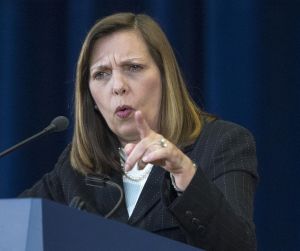
Iranian Foreign Minister Mohammad Javad Zarif, left, is welcomed by Cuban Foreign Minister Bruno Rodriguez, in Havana, Cuba, Monday, Aug. 22, 2016. Iran’s foreign minister begun a Latin American tour in Cuba, declaring Iran and Cuba united by their histories of resisting what he called U.S. atrocities. Zarif also plans to visit Nicaragua, Ecuador, Chile, Bolivia and Venezuela. (AP Photo/Ramon Espinosa)
Intel sharing with Cuba endangers America, lawmakers warn
BY: Adam Kredo, Washington Free Beacon
Obama administration efforts to bolster the sharing of critical intelligence data with Cuba is likely to benefit Iran, which has been quietly bolstering its foothold in the country with the communist government’s approval, according to conversations with members of Congress and other sources familiar with the matter.
A little noticed Obama administration directive on Cuba, released Oct. 14, instructed the U.S. director of national intelligence to assist and cooperate with Cuba’s intelligence services.
The directive has raised red flags on Capitol Hill, where some lawmakers are concerned that Cuba will pass along critical U.S. intelligence to the Iranians, who have made moves in recent years to extend their influence in the communist country and other Latin American countries hostile to the United States.
Iran’s interest in Cuba was on fully display earlier this year when Javad Zarif, Iran’s foreign minister, went on a goodwill tour throughout Latin America that included stops in Cuba and Venezuela, among others.
The goal of this visit, sources told the Washington Free Beacon, was to solidify Iran’s growing terrorist network in the region and ensure the Islamic Republic maintains its presence along America’s doorstep.
“The Castro regime has shown no inclination to end its anti-American activities, including espionage,” Rep. Mario Diaz-Balart (R., Fla.) told the Free Beacon. “The Castro regime in August and September 2016 deepened ties with Iran through high level visits, and there are reports that Iran-backed terrorist group Hezbollah has established a base in Cuba.”
“The director of national intelligence, General James R. Clapper, testified in February 2016 that the Castro dictatorship remained an espionage threat at the level of Iran, behind only China and Russia,” Diaz-Balart added. “Under these circumstances, President Obama’s directive to encourage intelligence sharing with the Castro regime is reckless, dangerous, and contrary to U.S. national security interests.”
Iran has been interested in Latin America for years, but now has the resources to pursue a footprint in the region as a result of the cash windfall provided by last summer’s comprehensive nuclear agreement.
Hezbollah, the terror organization funded and directed by Iran, has had assets in the region for some time.
Feature continues here: Cuba’s Dangerous Liaisons
Iranian Foreign Minister Mohammad Javad Zarif is welcomed by Cuban Foreign Minister Bruno Rodriguez, in Havana, Cuba / AP



